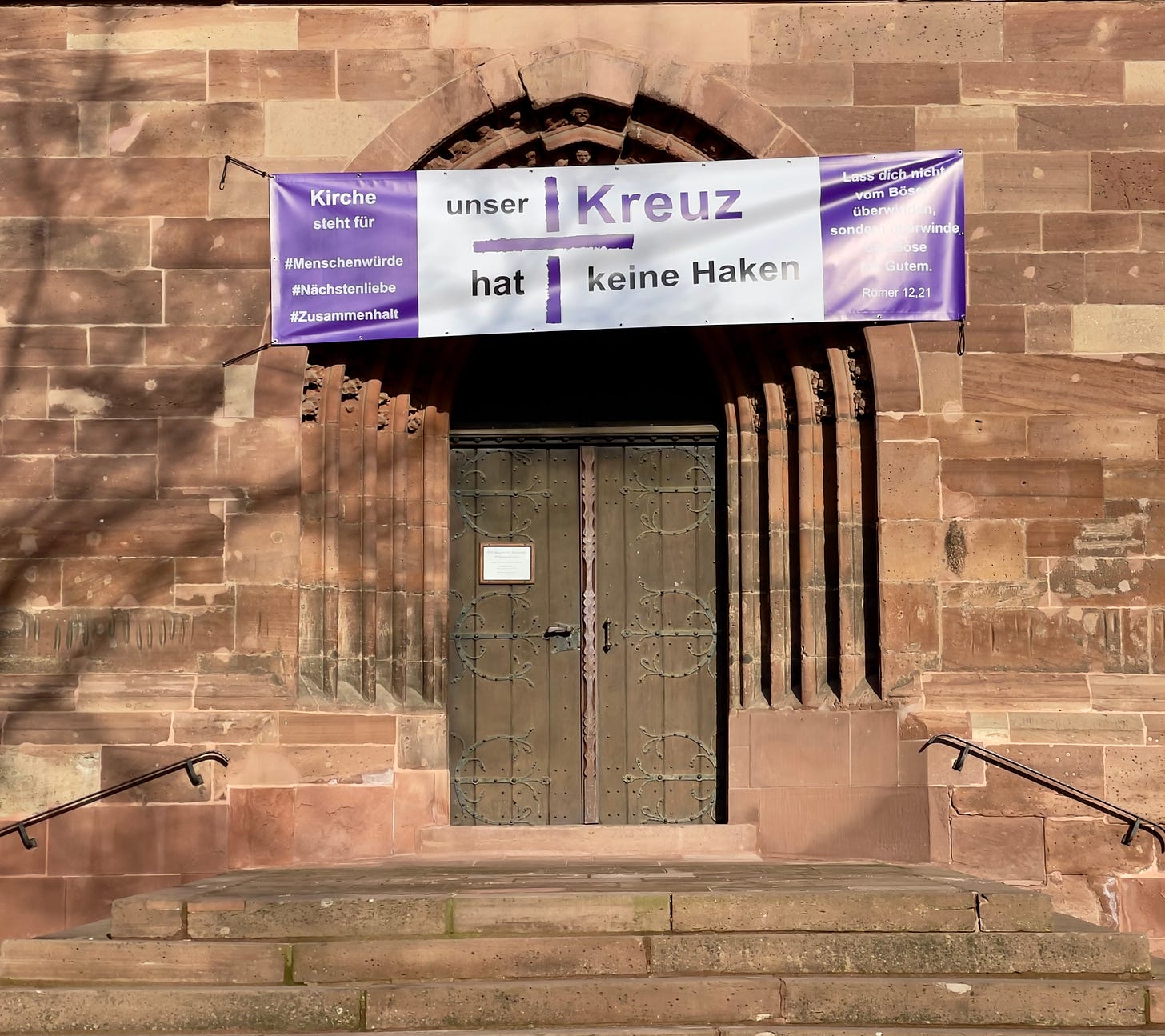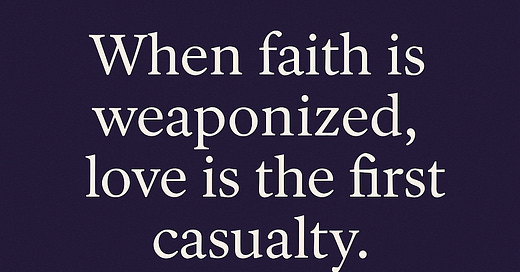
Introduction
As a German non-binary, neurodivergent, highly sensitive person (HSP), and lesbian woman, I never imagined I'd be writing about American politics. Yet some of you have asked me to write about this.
The rise of Christian nationalism in the U.S. fills me with a chilling sense of déjà vu. Having studied the horrors of the Third Reich, I recognize a familiar pattern: the distortion of a powerful belief system to justify oppression and consolidate power.
While the Nazis cloaked their ideology in Germanic supremacy rather than Christianity, the underlying mechanisms are eerily similar – the creation of an "us vs. them" narrative, the dehumanization of marginalized groups, and the erosion of democratic norms. My concern is not just academic; it's deeply personal.
Any movement that seeks to erase identities and deny fundamental rights threatens the very fabric of a just society, a lesson history has etched in blood. This is why I feel compelled to speak out.
This essay is not simply an analysis; it's an act of resistance. It's a call for clarity in a world deliberately obscured by misinformation and fear. My goal is to equip you, the reader, with the tools to discern between the life-affirming principles of genuine faith and the destructive ideology of Christian nationalism.
Core Values Across Faiths
When I think about core values that transcend specific cultural or political contexts, I see echoes of these principles in many of the world's major religions, even though they're expressed in different ways.
Love and compassion: Christianity teaches "Love your neighbor as yourself" (Mark 12:31). Similar concepts of compassion and love for others are found in metta in Buddhism, chesed in Judaism, and rahma in Islam.
Justice and righteousness: "Seek justice, love mercy, and walk humbly with your God" (Micah 6:8) is a Christian teaching. The pursuit of justice and righteousness is also central to dharma in Hinduism and Buddhism, tzedek in Judaism, and adl in Islam.
Inclusivity and acceptance: Christianity says "For God so loved the world..." (John 3:16). The idea of universal acceptance and the inherent worth of all beings is reflected in the concept of ahimsa (non-violence) in Hinduism, Buddhism, and Jainism, and the emphasis on the umma (community) in Islam.
Humility and service: Jesus washing the disciples' feet (John 13) is a powerful image in Christianity. The value of service and humility is emphasized in the concept of seva in Sikhism and Hinduism, and the importance of serving others in Islam.
Peace and non-violence: "Blessed are the peacemakers" (Matthew 5:9) is another Christian teaching. The pursuit of peace is a core value in many religions, including shalom in Judaism, salam in Islam, and the emphasis on non-violence in Jainism.
Forgiveness and reconciliation: The Parable of the Prodigal Son in Christianity highlights the importance of forgiveness and reconciliation. Similar emphases are found in the concept of teshuvah (repentance) in Judaism and the emphasis on forgiveness in Islam.
These values, in their purest form, promote human dignity, equality, and the importance of community.
They aren't inherently tied to any particular political ideology. It's crucial to recognize this, because it helps us see how easily faith can be manipulated when it's intertwined with political agendas that prioritize power and exclusion.

Distortions of Christian Nationalism
In stark contrast, Christian nationalism, as it is manifesting in the U.S., is a political ideology that, in my observation, often appropriates Christian symbols and language to advance a narrow, exclusionary agenda. I see it characterized by:
Patriarchal Dominance: This ideology often entails the subjugation of women and the enforcement of rigid gender roles, frequently drawing on selective interpretations of scripture. It operates in ways that diminish women’s autonomy and agency,, often contradicting the emphasis on equality and justice found in many spiritual traditions. The historical connection to male dominance, as seen in the actions of Roman emperors, medieval kings, and figures who emulate such power, highlights the deep roots of this particular distortion.
Exclusion and Othering: Christian nationalism exhibits a tendency to define who is a "true" American (or a "true" Christian) based on narrow criteria of ethnicity, sexual orientation, and gender identity. This often leads to the dehumanization and persecution of those who do not fit the ideal. It directly contradicts the core values of inclusivity and acceptance found in many religions, not just in Christianity.
Authoritarianism and Hierarchy: This ideology expresses a desire for a strong, centralized authority that enforces a specific set of "Christian" values, often suppressing dissent and individual liberties. This aligns with what I describe as a "medieval feudalist patriarchal hierarchical dominant exploitative behavior." It prioritizes order and control over individual rights and freedoms, often mirroring power structures that many religions, in their ideal forms, sought to challenge.
The Conflation of National and Religious Identity: Christian nationalism promotes the belief that America is a "Christian nation" with a divine mandate, leading to a rejection of secularism and pluralism. This "us vs. them" mentality sees those who do not share their beliefs as outsiders, even as enemies. This directly contradicts the core values of peace and reconciliation found in many faiths.
Justification of Violence and Oppression: In extreme cases, Christian nationalism employs religious rhetoric to justify violence against those deemed "enemies" of the state or the "Christian" nation. This is a terrifying potential consequence of the conflation of religious and political power, and a complete betrayal of the core values of non-violence and compassion.
So What Exactly is the Threat to American Democracy and its Core Values?
The danger of Christian nationalism lies in its ability to distort and weaponize faith, turning it into a tool of oppression and division. It replaces the core values of Christianity (and, arguably, the core values of many religions) with a political agenda that is fundamentally anti-democratic and antithetical to the principles of individual liberty and equality that, at least in theory, underpin the American system.
The American Core Values, as I have discerned them
To understand the threat this poses, it's crucial to define the core values that have been widely seen, especially in the last 50 years, as fundamental to American democracy and human dignity:
Separation of Church and State: The principle that the government should not endorse or establish a state religion, ensuring religious freedom for all.
Religious Pluralism: The acceptance and respect for diverse religious beliefs and practices within a society.
Individual Rights and Liberties: The recognition that all individuals possess certain fundamental rights, including freedom of speech, freedom of assembly, and freedom of conscience.
Equality and Justice for All: The principle that "No person shall be favored or disfavored because of sex, gender identity, sexual orientation, parentage, ethnicity, skin color, language, homeland and origin, faith, or religious or political opinions. No person shall be disfavored because of disability." This principle underscores the commitment to equal treatment and opportunity for every individual in society.
Bodily Autonomy and Reproductive Rights: The recognition of the right of individuals to control their own bodies and make decisions about their reproductive health, free from government interference. This also encompasses the right to safety and freedom from sexual violence.
Universal Suffrage and Voting Rights: The right of all citizens to vote, regardless of gender, ethnicity, or origin. This principle ensures that all voices are heard in the democratic process.
Human Dignity: The inherent worth and value of every human being, which should be respected and protected.
Why does Christian Nationalism endanger American values?
Christian nationalism, in its pursuit of a "Christian nation," undermines these core principles:
Erosion of the Separation of Church and State: Christian nationalism seeks to dismantle the wall between church and state, which has been a cornerstone of American democracy. This would lead to the imposition of a particular religious viewpoint on all citizens, regardless of their own beliefs, and would violate the principles of religious freedom.
Threats to Minority Rights: The exclusionary nature of Christian nationalism poses a direct threat to the rights and safety of minority groups, including individuals from diverse ethnic backgrounds, religious minorities, LGBTQ+ individuals, people with disabilities, transgender and gender non-conforming individuals, and others who do not fit its narrow definition of "American." This is a violation of the core principles of inclusivity and acceptance that are central to many faiths and the principle of equality as defined above.
Undermining of Democratic Norms: The authoritarian tendencies within Christian nationalism can undermine democratic norms such as free and fair elections, freedom of speech, and the rule of law. This disregards the fundamental rights and liberties of individuals.
Disregard for Bodily Autonomy and Reproductive Rights: The patriarchal dominance inherent in Christian nationalism is evident in the attacks on abortion rights, restrictions on women's healthcare, and the normalization of sexual violence. These actions directly violate bodily autonomy and reproductive rights.
Voter Suppression and Disenfranchisement: Christian nationalist efforts to restrict voting access, such as the implementation of strict voter ID laws requiring birth certificates in current names and proof of U.S. birth, disproportionately disenfranchise women (who may have changed their names) and immigrants, undermining the principle of universal suffrage and fair representation.
Perpetuation of Systemic Inequalities: Christian nationalism often ignores or actively opposes the ongoing struggle for justice and the dismantling of systemic inequalities that affect marginalized communities. This contradicts the Christian principles of love and justice, as well as the American ideal of equality as defined above.
Marginalization of People with Disabilities: The movement's emphasis on a narrow definition of "normalcy" can lead to the marginalization and exclusion of people with disabilities, denying them their full dignity and participation in society. This clashes with the Christian emphasis on compassion and the American value of equal opportunity.
Erasure and Discrimination Against Gender Identities and Transgender People: Christian nationalism actively seeks to erase the identities and rights of transgender and gender non-conforming individuals, denying them access to healthcare, legal recognition, and basic human dignity. This fundamentally contradicts the Christian principle of love and acceptance and the American value of individual liberty, and disregards the diversity of gender identities.
Disregard for Human Dignity: By promoting exclusion, discrimination, and oppression, Christian nationalism violates the inherent human dignity of those deemed "outsiders."
A German Lens: Learning from History
For me, as someone from Germany, the entanglement of faith, national identity, and racial ideology is not a distant lesson—it’s a living echo. Under National Socialism, Christianity in Germany was neither wholly embraced nor wholly rejected. It was reshaped, racialized, and used to legitimize a vision of ethnic supremacy and national unity. A "German Christianity" emerged, stripped of its Jewish roots, fused with nationalist rhetoric, and aligned with state power.
This wasn’t an abstract ideological shift—it was systemic. And it left something behind. In me, it lives as a kind of societal trauma. Not because I experienced it directly, but because I live in a country—and in a nervous system—shaped by what happens when spiritual language is twisted to justify exclusion. The disregard for human dignity that once defined an era didn’t disappear. It became part of what I recognize instinctively, even when the signs are subtle.
Post-1945 Germany didn’t simply turn to secularism out of principle. It was a move shaped by devastation and accountability. After seeing how easily religious identity could be instrumentalized, how quickly values could be subordinated to ideology, the separation of religion and state became a necessary response—not a rejection of faith, but a boundary to prevent its misuse.
Today, open expressions of religious nationalism are rare in Germany. And still, observing how similar ideologies are gaining ground elsewhere—particularly in the U.S. and Hungary—makes it clear to me that the underlying structures haven’t disappeared.
To write this essay, I developed a comparative analysis titled Puritanism, Nationalism, and Heritage. In it, I trace how these movements often follow a similar logic: invoking a sense of divine purpose, positioning outsiders as threats, and rewriting history to legitimize control.
Why This Matters—Globally and Personally
The danger of Christian nationalism is not confined to one country. It reverberates across borders, influencing policies, empowering far-right movements, and undermining interfaith and democratic collaboration. It denies space for the coexistence of differing truths, identities, and beliefs—refusing the possibility that people can live together in mutual dignity.
And perhaps that’s what stays with me most: this ideology doesn’t just distort Christianity. It hollows it out.
It replaces the radical vulnerability of grace with the demand for control.
Conclusion
So, to bring it all together: Christian nationalism in the US? It's not just a political thing; it's a chilling echo of the past, a ghost of ideologies that thrived on 'us vs. them' and the crushing of anyone who didn't fit the mold.
And let's be cristal clear, this isn't just about abstract ideas. We're talking about real threats – the flouting of court orders, people being detained without a shred of due process, and the very real possibility of this targeting anyone who doesn't align with their narrow view of who "belongs."
This is personal. This is about protecting the right of everyone to simply exist, to live as their true selves.
I choose to speak, to resist, to stand in what I believe. You might find your own way to act. History has shown us, the cost of silence is far too high.
In these turbulent times, information is not enough; discernment is essential.
The ability to critically analyze the narratives we are told, to question power, and to hold fast to our conscience is, in my view, our most potent defense against the encroachment of any ideology that seeks to divide and control.
Here's your takeaway:
Recognize the patterns: Learn to identify the hallmarks of exclusionary ideologies – the "us vs. them" rhetoric, the scapegoating of minorities, the suppression of dissent. These patterns transcend specific religions or nationalities.
Trust your inner compass: Your dignity, your conscience, your innate sense of justice – these are your guides. When a message clashes with your core values, question it, regardless of its source.
Find your voice, and find your community: Speak out, in whatever way feels authentic to you. Share information, support those who are targeted, create art, build community. Remember, together we are stronger. As Gloria Horton-Young demonstrates in her vital work even in the face of immense adversity, courage and collective action can make a difference. We each have a role to play in resisting oppression.
This is not just about America; it's about the universal struggle for dignity, freedom, and the right to exist as our true selves. By understanding the tactics of Christian nationalism, we can inoculate ourselves against its poison and work towards a world where difference is celebrated, not demonized.
Support My Work: Subscribe and Contribute
If this reading resonates with you, great! And if not, no worries. Take whatever may be helpful and leave the rest.
If my writing, art, and recipes resonate with you, I would be incredibly grateful if you would consider supporting my work with a paid subscription to Wild Lion*esses Pride.
If a monthly or annual subscription isn’t feasible for you right now, you can also show your support with a one-time tip via my Tip Jar here.
Thank you for your kindness and generosity—it truly makes a difference. Together, we’re creating a space of reflection, creativity, and connection, and I’m so grateful you’re part of this journey
Since January 2024, my mental health has forced me onto sick leave, leaving Monty and me with a mere €350 a month. And, as I shared in 'When Healing Means Losing Everything,' the reality is, this isn't sustainable.
By the end of 2025, I face losing my home and my car, forced to leave a country that no longer feels like home. I'm building a new life, a new beginning, and your support could be the bridge.
>our contribution directly fuels this work, allows me to keep sharing, and helps me build a future.
















Share this post